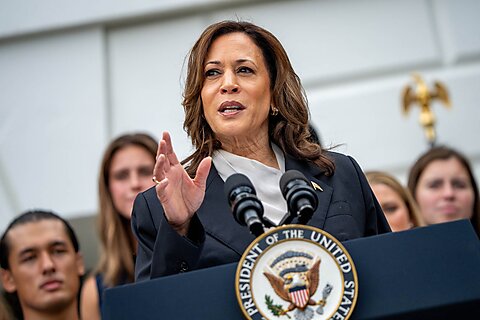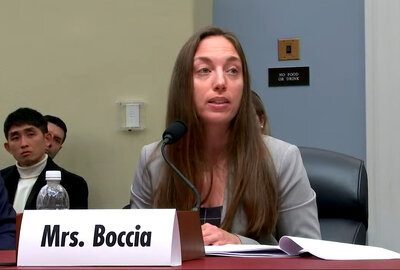
Media outlets are identifying vice-presidential options for likely presidential candidate Kamala Harris. Many of the VP options are state governors.
Cato grades the governors from “A” to “F” every two years on their tax and spending policies. The “A” governors push for lower taxes and spending, the “F” governors push for higher taxes and spending, and there are many governors in between.
Potential VP picks are listed below with their past Cato grades and a few notes on recent tax policy actions. Past Cato reports are here. The 2024 report will be released in October.
Progressive Democratic governors oppose nearly all tax cuts, and they often push for tax hikes hitting high-earners and businesses. The only tax cuts they favor are narrow low-income breaks and loopholes for favored corporations.
Moderate Democratic governors may go along with income tax rate cuts when pressed, and they may resist efforts to hike broad-based taxes unless they perceive a serious budget need.
Based on tax policy, I would put Newsom, Pritzker, and Whitmer in the category of left-wing progressives, and I would put Polis, Beshear, Cooper, and Shapiro in the category of moderates.
Gavin Newsom, California. Took office January 2019
Cato grades: 2022 (F), 2020 (C)
In 2022, Newsom approved legislation providing one-time rebates for low-income families. But he also approved a large tax hike on wages with SB 951, which increased payroll taxes to fund the state disability insurance program. The hike will raise taxes at least $3 billion annually and increase the state’s top tax rate on wages to 14.4 percent.
In 2024, Newsom signed a budget that raises corporate tax revenues $15 billion over the next three years.
Jared Polis, Colorado. Took office January 2019
Cato grades: 2022 (C), 2020 (C)
In 2022, Coloradans passed Proposition 121 cutting the individual and corporate tax rates. Polis endorsed the measure.
In 2023, Polis supported Proposition HH, which would have cut property taxes but would have also reduced taxpayer rebates under the TABOR mechanism. Voters rejected the plan.
In 2024 Polis signed SB 228, which changed TABOR to reduce income tax rates but not the total amount refunded to taxpayers. He also signed HB 1311, which created a new family tax credit, but the credit will reduce the amount of revenues refunded under TABOR.
Lastly, Polis signed SB 230, which imposed a fee on the oil and gas industry to raise $138 million a year for subsidizing public transit and other programs.
J.B. Pritzker, Illinois. Took office January 2019
Cato grades: 2022 (F), 2020 (F)
Pritzker has been raising taxes almost continuously since he entered office but with some narrow tax breaks mixed in. In recent years, he reduced inflation indexing under the income tax, and he has pushed for a sports wagering tax and limits on business deductions. While Pritzker favors higher taxes on businesses in general, he hands out narrow breaks to big corporations, such as $213 million in tax credits to a Chinese battery maker building a facility in Illinois.
Andy Beshear, Kentucky. Took office December 2019
Cato grades: 2022 (D)
Beshear proposed modest tax cuts in 2022, including freezing vehicle property tax rates and reducing the sales tax rate for a year. But he vetoed HB 8, which cut income taxes, and the legislature overrode him to enact the reforms.
Beshear changed direction in 2023 and reluctantly approved tax reforms. He signed HB 1, which accelerated the income tax cuts passed in 2022. That decision made political sense because he is running for reelection this year, and if he had vetoed the bill the legislature would have likely overridden him.
Gretchen Whitmer, Michigan. Took office January 2019
Cato grades 2022 (F), 2020 (F)
Whitmer has repeatedly vetoed reforms reducing income tax rates, but she has approved a smattering of narrow breaks such as low-income credits and tax cuts for retirement income. Recently, she proposed a gimmicky rebate of $1,000 for gas-powered cars, $2,000 for electric vehicles, and an extra $500 for union-made cars.
Governor Roy Cooper, North Carolina. Took office January 2017
Cato grades: 2022 (B), 2020 (C), 2018 (F)
In 2021, Cooper went along with the legislature and approved large income tax rate cuts, but in 2023 he reversed course and did not sign further tax reforms passed by Republican legislators.
In 2024, Cooper proposed raising future corporate taxes, cutting the state’s school choice program, and replacing the state’s flat-rate individual income tax with a two-rate system. The legislature rejected the plan.
Governor Josh Shapiro, Pennsylvania. Took office January 2023
Shapiro has not been graded by Cato yet. Over his first year and a half in office, he has supported both tax cuts and tax increases.
Shapiro’s predecessor in office, Tom Wolf, signed a phased-in corporate tax rate cut, and Shapiro supports the reform. Shapiro has not pushed for a severance tax on the energy industry, as Wolf had done, and he has proposed exempting cell phone bills from sales taxes.
However, Shapiro has favored some tax hikes. He supports cap-and-trade plans to raise hundreds of millions of dollars a year from electric utility customers, and he is proposing a new tax on electronic gaming machines.










